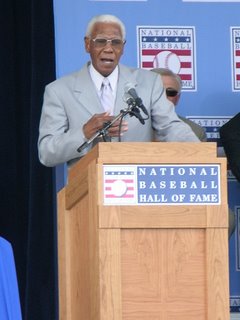
Buck O'Neil addresses Hall of Fame audience
By Claire Smith
Inquirer Staff Writer
COOPERSTOWN, N.Y. - On a sun-splashed, sultry day, the National Baseball Hall of Fame and the major leagues shone a light, perhaps for one last time, on the racial chasm that once divided a sport and a nation.
And judging by the celebratory air that surrounded the induction of not only relief ace Bruce Sutter but 17 luminaries from the era of Negro league baseball, closure was very much at hand.
"It is an awesome responsibility to stand before you and try to explain to you how important this day is to us," Jackie Robinson's daughter, Sharon, told the audience gathered to salute the Hall's largest induction class ever as well as Houston Astros announcer Gene Elston (Ford C. Frick Award) and baseball writer Tracy Ringolsby of the Rocky Mountain News (J.G. Taylor Spink Award).
Hall of Famer Monte Irvin, speaking after the ceremony, agreed. "This was a momentous day," he said, "because something you never thought would happen did happen. It's a great, great day."
It was made all the more special because of what was lacking. For there was no bitterness to be found despite the many heartfelt examinations of one of the nation's most divisive eras.
Despite his surprising exclusion from the latest group of Negro league-era inductees, Buck O'Neil, the legendary Kansas City Monarchs manager, warmed the audience with his grace and sheer joy for those who were selected.
"I want you to light this valley up today," said O'Neil, who also brought some Southern black preaching to the outdoor setting when he had the audience join hands and sing a repeated refrain: "The greatest thing in the world is loving you."
Love was not a theme exclusive to the distant past. Sutter, the Lancaster native and revolutionary split-fingered fastball specialist who pitched for the Cubs, St. Louis and Atlanta, was brought to tears when speaking of his deceased parents, his sons and his wife, Jamie, who is battling illness.
"I wouldn't be here without you," a choked-up Sutter told sons Josh, Chad and Ben.
"And," Sutter said, addressing the woman who has been his wife since he was in the minor leagues, "I know we have challenges to face, but we'll meet them as we always do - together."
The many family members of the Negro league-era honorees completed the sense of family. The new enshrines included:
Frank Grant, considered the preeminent black player of the 19th century, whose career in the integrated minor leagues was sidetracked when the notorious "gentlemen's agreement" made by white team owners segregated the game in the 1890s.
Standout centerfielder Pete Hill, who graced the Philadelphia Giants among other teams in the early 1900s.
James Raleigh "Biz" Mackey, the legendary player-manager who led Philadelphia's Hilldale club to a Colored World Series crown in 1925 and the Newark Eagles to the Negro League World Series crown in '46.
Louis Santop, the starting catcher for the Hilldale teams that won three straight Eastern Colored League pennants from 1923 to '25.
Effa Manley, a Philadelphian noted for her innovations as Newark Eagles co-owner, her civil rights work - and the distinction of being the first woman enshrined in the Hall.
Also enshrined were pitching ace and pennant-winning manager Andy "Lefty" Cooper; Alex Pompez, Jose "The Black Diamond" Mendez, and Cristobal Torriente, who were legends in both their native Cuba and black baseball; innovative club owners J.L. Wilkinson and Cumberland Posey Jr.; and prolific power hitter George "Mule" Suttles.
Homestead Grays pitching ace Ray Brown, slugging Monarchs centerfielder Willard "Ese Hombre" Brown, defensive first-base standout Ben Taylor, player, manager and historian Solomon White, and Ernest "Jud" Wilson also now reside among their fellow baseball immortals.
What the Hall started in 1971 with the election of Negro league legend Satchel Paige and continued with the selection of 17 other stars from the league over the years may now be compete. But Irvin, for one, is not ready to say that. Not when O'Neil still patiently awaits at age 94.
"I have no clue as to why he wasn't selected," said Irvin, adding his voice to a list of Hall of Famers now actively campaigning for O'Neil's inclusion, including Joe Morgan, Lou Brock, Ernie Banks and Henry Aaron. "I'm just hoping he might live long enough that he might get some consideration."
No comments:
Post a Comment